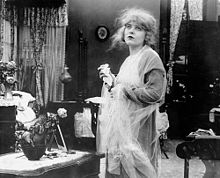| This article relies largely or entirely on a single source. Relevant discussion may be found on the talk page. Please help improve this article by introducing citations to additional sources. Find sources: "The Avenging Conscience" – news · newspapers · books · scholar · JSTOR (March 2017) |
| The Avenging Conscience | |
|---|---|
 Theatrical release poster Theatrical release poster | |
| Directed by | D. W. Griffith |
| Written by | D. W. Griffith |
| Based on | "The Tell-Tale Heart" and "Annabel Lee" by Edgar Allan Poe |
| Produced by | D. W. Griffith |
| Starring | Henry B. Walthall Blanche Sweet Spottiswoode Aitken |
| Cinematography | G.W. Bitzer |
| Edited by | James Smith Rose Smith |
| Music by | S. L. Rothapfel |
| Production company | Majestic Motion Picture Company |
| Distributed by | Mutual Film Corporation |
| Release date |
|
| Running time | 78 minutes |
| Country | United States |
| Languages | Silent English intertitles |
The Avenging Conscience: or "Thou Shalt Not Kill" is a 1914 silent horror film directed by D. W. Griffith. The film is based on Edgar Allan Poe's 1843 short story "The Tell-Tale Heart" and his 1849 poem "Annabel Lee".
Plot

A young man (Henry B. Walthall) interested in the works of Edgar Allan Poe, falls in love with a beautiful woman (Blanche Sweet), but he is prevented by the uncle (Spottiswoode Aitken) that raised him since childhood from pursuing her. Tormented by visions of death and suffering and deciding that murder is the way of things, the young man kills his uncle and builds a wall to hide the body.
The young man's torment continues, this time caused by guilt over murdering his uncle that was overheard by an Italian witness, and he becomes sensitive to slight noises, like the tapping of a shoe or the crying of a bird. The ghost of his uncle begins appearing to him and, as he gradually loses his grip on reality, the police figure out what he has done and chase him down. In the ending sequence, we learn that the experience was all a dream and that his uncle is really alive. They make up, and the nephew gets to marry the sweetheart.
Cast
- Henry B. Walthall as the nephew
- Blanche Sweet as his sweetheart
- Spottiswoode Aitken as the uncle
- George Siegmann as the Italian
- Ralph Lewis as the detective
- Mae Marsh as the maid
- Robert Harron as the grocery boy
- George Beranger
- Wallace Reid — the doctor
Reception
Dennis Schwartz, labeling the film with a grade of B−, labeled it as a film with important historical value as "the first great American horror film."
References
- "Progressive Silent Film List: The Avenging Conscience". Silent Era. Retrieved 2008-10-30.
- The AFI Catalog of Feature Films:The Avenging Conscience
- "AVENGING CONSCIENCE, THE – Dennis Schwartz Reviews".
External links
- The Avenging Conscience at IMDb
- The Avenging Conscience is available for free viewing and download at the Internet Archive
| Edgar Allan Poe's "The Tell-Tale Heart" (1843) | |
|---|---|
| Adaptations |
|
| Related | |
This 1910s horror film-related article is a stub. You can help Misplaced Pages by expanding it. |
- 1914 films
- 1914 drama films
- 1914 horror films
- 1910s American films
- 1910s English-language films
- 1910s horror drama films
- American black-and-white films
- American horror drama films
- American silent feature films
- Films based on multiple works
- Films based on poems
- Films based on The Tell-Tale Heart
- Films directed by D. W. Griffith
- Mutual Film films
- Silent American drama films
- Silent American horror films
- Surviving American silent films
- English-language horror drama films
- Pre-1960 horror film stubs
- 1910s film stubs